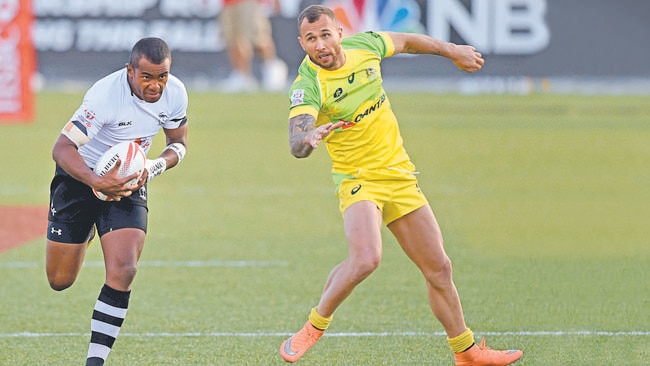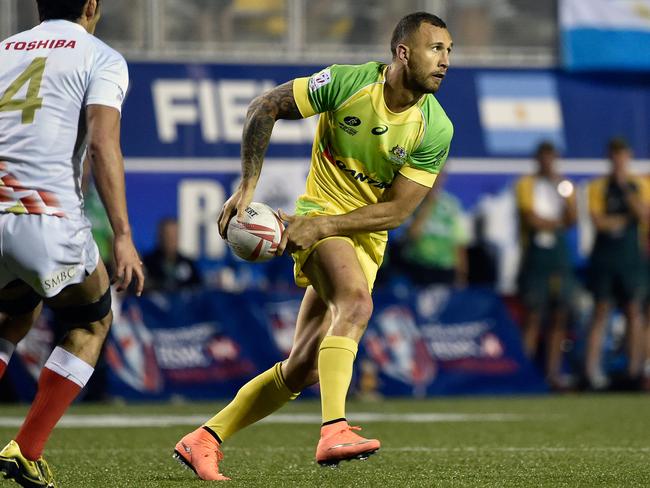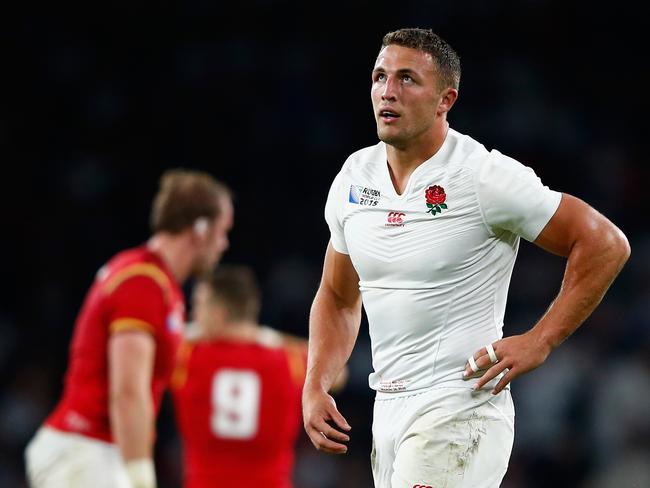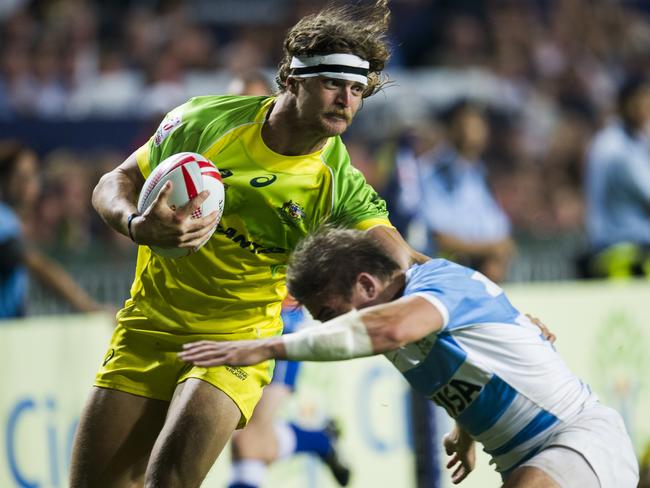Why Quade Cooper’s Olympic dream has been cut short
WITH Quade Cooper cut from the selection pool for the Olympics, Aussie Sevens coach Andy Friend has avoided a major catastrophe.

Rugby
Don't miss out on the headlines from Rugby. Followed categories will be added to My News.
OPINION
WHETHER you are a close follower of his, a distant supporter or even an opposing rugby tragic, all rugby fans will agree that on his day 58-Test Wallaby Quade Cooper is one of the most exciting playmakers in Australian rugby.
With the ability to spark electricity from nothing and a playing style that will often leave fans and opposition players questioning what he is going to do next, there is no denying the talent of the New Zealand-born flyhalf, when he is in form.
Considering then his rich vein of form with French club Toulon early this year, many rugby fans will this week be scratching their heads at the decision made by Australian Sevens coach Andy Friend to cut Cooper from the selection pool for the final two rounds of the HSBC Sevens World Series and for the Rio 2016 squad.
Friend noted a limited opportunity for the 28-year-old to work with the squad as the main reason for his exclusion, given his commitments with Toulon restricted his regular involvement in the set-up.
“We just haven’t had the opportunity to work with him as much as we would have liked over the past five months,” Friend said.
“Each day I have a group of 20-plus players working on different structures and patterns of play and I don’t think we would have got the very best out of Quade had we just thrown him into a tournament with limited preparation — particularly for an event as momentous as the Olympics. As many players have found out throughout this season’s World Series, it is no easy task to transition from fifteens to the sevens form of the game.”

As bizarre as it may seem to exclude such a high-quality player from the Olympic squad, Friend’s decision could not have been more correct — there is certainly method to his perceived madness.
While to the untrained eye, sevens rugby may just look like a mess of players trying to out-sprint each other, it is in fact a meticulously structured game, where teams are hinged on proven systems and ingeniously devised plays. And it is certainly not something that can be learnt overnight. While sevens shares a multitude of direct similarities with the 15-man game, the differences are significant enough for it to be looked upon as a separate football code all together.
So to throw a player into sevens rugby months out from the Olympics, with limited exposure to those systems and structures, you leave yourself incredibly vulnerable to the possibility of creating a scenario very similar to that of Sam Burgess’ swift transition to rugby union and into the World Cup.
While the player may possess the skill attributes required on paper, applying them to an entirely different game takes time if you are to get a perfect end result. Anyone can agree that rushing a player into such a scenario has a limited chance of success — often it creates animosity with fans and the media, and can have a strong negative impact on the player’s confidence and perception of the sport they are accused of “failing” at. It is rarely a lack of talent that sees these players struggle when they switch codes, but more a lack of experience and time allowed to develop in that environment. Benji Marshall’s less that successful transition to rugby while playing for the Auckland-based Blues is proof enough that skill is not a contributing factor in these scenarios.

If time is then an issue, one may argue that former Western Force and Wallaby flyer Nick Cummins will be in a similar position. Cummins signed with the Aussie Sevens team in January, but did not feature until last month’s tournament in Hong Kong, which saw him pick up an ankle injury and rule him out of action for a month. So with just the Paris and London tournaments left, Cummins would have less time to settle into the system than Cooper.
It is easy to forget however that while Cooper started his professional rugby career with the Queensland Reds in the 15-man code, Cummins first made his mark on the professional scene as a 19-year-old on the Sevens World Series. The winger went on to earn eight World Series caps in 2007, and later represented Australia at the 2010 Commonwealth Games, where he won a silver medal. His experience in the short form of the game is far more extensive than that of Cooper.
What makes the challenge even more difficult for Quade is his position.
As a playmaker, he can’t afford to be hazy on the structures he is supposed to be in charge of. Playmaking in sevens is an entirely different beast to that of conventional rugby. There is no full forward pack to throw the ball to settle the play, you don’t have the luxury of playing phase after phase to crack the defence and you certainly don’t have time to enact a long-winded attack strategy. As a playmaker, Cooper would need to quickly adjust to running a quicker and more expansive style of play. For someone like Cummins, who plays predominantly out wide on the wing as he does in 15s, the adjustment is nowhere near as drastic.

While Quade is an outstanding player in his own right, his inclusion in the Olympic squad would also not be fair to the plight of the incumbent sevens players that have been in the system for years. Yes I’m aware fairness is not often considered over the desire to win in professional sport, however the ability and experience of the squad’s current playmakers is nothing to turn your nose up at.
Despite missing the remainder of the World Series through injury, Lewis Holland is now all but assured a place in Rio, and rightly so. His performances at the Sydney tournament, where the Aussies narrowly lost to New Zealand in the final, were proof enough that he has the ability to lead the squad on to Olympic glory. Long-serving back Cam Clark is also more than comfortable in the playmaker role, while young John Porch has the ability to step up if required.
No one can argue that Cooper would provide a dangerous weapon in Rio, however his lack of experience makes him too much of a risk to the campaign. Here’s hoping we see him develop on the sevens circuit in years to come.
Originally published as Why Quade Cooper’s Olympic dream has been cut short


